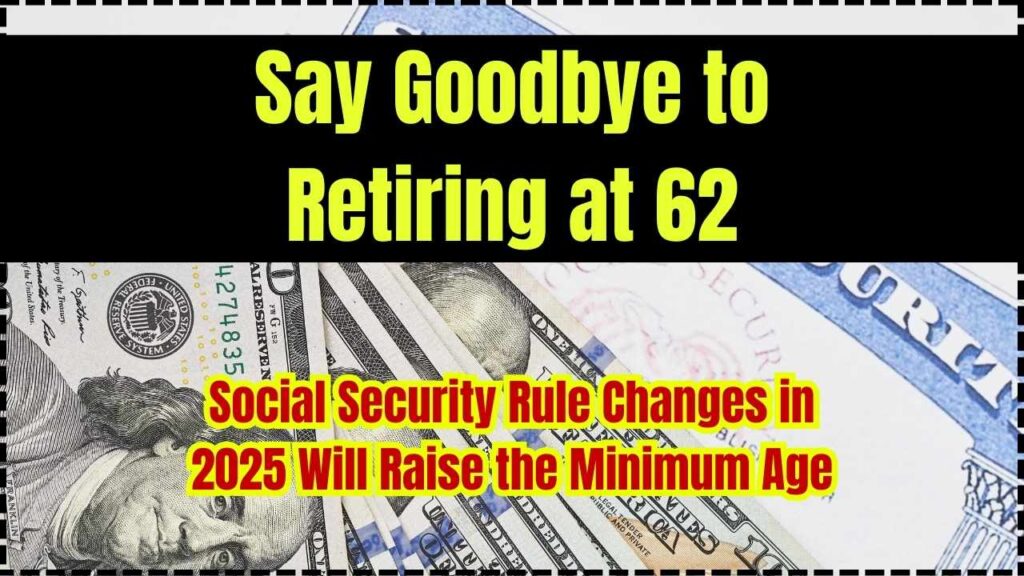
Social Security Rule Changes in 2025: Retiring at 62 has long been the American dream. But big changes are rolling out in 2025, making it crucial for folks to rethink their game plan. The Social Security Administration (SSA) is tweaking the rules, and these changes could seriously impact when you can retire and how much you’ll get in benefits. In this guide, we’ll break down everything you need to know—whether you’re 10 or 100—about Social Security retirement changes in 2025. We’ll keep it simple, clear, and packed with expert advice.
Social Security Rule Changes in 2025
The Social Security retirement changes in 2025 are shaking things up, especially with the Full Retirement Age rising. While you can still claim benefits at 62, it’s essential to weigh the long-term impact on your income.
| Topic | Details |
|---|---|
| Full Retirement Age (FRA) in 2025 | 66 years and 10 months for those born in 1959 |
| FRA for those born in 1960 or later | 67 years |
| Earliest Eligibility Age (EEA) | Remains at 62, but early benefits are reduced |
| Benefit Reduction at Age 62 | Up to 30% reduction |
| Delayed Retirement Credits | 8% increase per year until age 70 |
| Potential Future Changes | Discussions about increasing FRA to 68 or 69 |
A Quick History of Social Security
Let’s rewind a bit. Social Security was born in 1935 during the Great Depression to help retired folks stay afloat. Since then, the program’s rules have shifted, including big changes in the 1983 amendments that slowly raised the Full Retirement Age (FRA). Now, in 2025, we’re seeing that plan in action with the FRA inching up again.
Breaking Down the Social Security Rule Changes in 2025
1. Full Retirement Age (FRA) Is Going Up
Starting in 2025, if you were born in 1959, your FRA will be 66 years and 10 months. Folks born in 1960 or later will see their FRA jump to 67. This means waiting longer to collect full benefits—or facing bigger cuts if you retire early.
2. You Can Still Retire at 62, But…
The Earliest Eligibility Age (EEA) stays at 62. But if you take benefits then, expect a 30% permanent reduction compared to waiting until FRA. This reduction sticks with you for life, so it’s a big decision.
3. More Benefits for Delaying Retirement
Here’s the silver lining: if you delay retirement past your FRA, you’ll snag an 8% increase per year, maxing out at age 70. So if you can wait, you’ll get a bigger check.
4. The Retirement Earnings Test
Still working before your FRA? In 2025, earning more than $23,400 could mean temporarily reduced benefits. Once you hit FRA, you can earn as much as you want without a penalty.
Real-Life Scenarios
🔹 Meet Sarah, age 62: She’s healthy but worried about finances. If she claims now, her benefits will be 30% less forever. After chatting with her financial advisor, she decides to keep working part-time and wait until 67 for full benefits.
🔹 Meet Joe, age 64: Joe’s ready to hang up his boots but wants a bigger check. He’s decided to hold off until 70, boosting his monthly payments by 24% over his FRA amount.
How to Prepare for the Changes?
Assess Your Financial Health
Review your savings, investments, and income sources. Can you afford to wait until FRA or even age 70?
Think About Your Health
Longer life expectancy? Delaying may make sense. Health concerns? Taking benefits earlier might be wise.
Keep Working If Possible
If you enjoy your job and can keep working, you might delay retirement and beef up your benefits.
Use Trusted Tools
Visit the SSA Retirement Estimator to crunch the numbers for your situation.
House Reconciliation Bill Passes; Federal Employees Brace for Major Retirement Shake-Up
2026 Retirement Payment Could Rise — Check How Much Your Check May Increase!
Federal Retirement Cuts Approved: What the House’s New Bill Means for Government Workers
Frequently Asked Questions (FAQs)
Q1: Can I still retire at 62 in 2025?
Yes, but expect a permanent reduction in your benefits—up to 30% if your FRA is 67.
Q2: What happens if I keep working after I claim benefits?
If you’re under FRA and earn more than $23,400, benefits may be reduced. After FRA, no reduction applies.
Q3: Will the retirement age increase again?
It’s possible. Discussions about raising FRA to 68 or 69 are ongoing, but no new laws have passed yet.
Q4: Should I delay retirement to 70?
It depends on your health and finances. Delaying can boost monthly benefits, but make sure it aligns with your needs.











